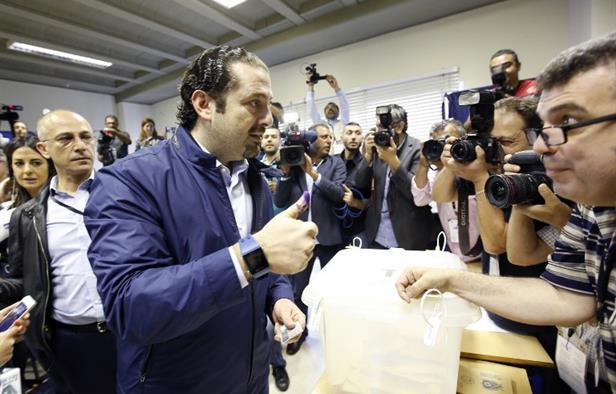Free at last/Win or lose, Saad Hariri may finally be his own man
Michael Young/Now Lebanon/May 12/16
While there has been a tendency to argue that the results of municipal elections in Beirut were a defeat of sorts for Saad Hariri—given the low turnout and the unexpectedly high vote total for the Beirut Madinati list—the reality is somewhat different. Hariri faced a test in the capital and, despite a five-year absence, passed it.
However, it is a very different Lebanese political environment to which the former prime minister has returned. The March 8-March 14 dichotomy no longer truly exists; Hariri is facing furtive challenges from within his own movement; and, generally speaking, many people believe his return was tied to the financial difficulties of his Saudi Oger company, so that he regarded politics as a means of compensating for this.
More revealing about Hariri’s limitations was not Beirut, but the elections in Zahle. There, the former prime minister backed the losing list of Myriam Skaff, against his past allies in the Lebanese Forces and the Kataeb. One of his first visits after arriving in Lebanon was to the Skaff home. This, effectively, placed him in the midst of a looming inter-Christian contest whose ramifications Hariri never fully comprehended.
Indeed, if there is one reality with which Hariri will have to come to grips, it’s that Christian attitudes toward him have changed fundamentally. This will represent a significant challenge at a time when the principal Sunni and Shiite parties are seeking to enroll Christians in their own political rivalries.
Despite the fact that the Lebanese Forces joined Hariri in the Byerti List in Beirut, relations between the two sides continue to be very poor. And that’s not likely to soon change. Samir Geagea and his followers felt betrayed by the clumsy way Hariri suddenly reversed himself with regard to his Christian ally, by endorsing Geagea’s major political foe, Sleiman Franjieh, for the presidency. Their response was to reconcile with Michel Aoun, a popular step among Christians, that in no way can be regarded as equivalent to Hariri’s opening to Franjieh.
This situation unleashed a longstanding, and ugly, Christian resentment of Sunnis, one that goes back to the time when the two communities were on opposite sides of Arab nationalism and the Palestinian struggle. Christian minority reflexes have returned, and are feeding into another belief from an older time, namely that the Shiite community, like the Christians, are a fellow minority in a Sunni-dominated Middle East.
This attitude has not translated into political behavior—the Lebanese Forces remain profoundly uneasy with Hezbollah. However, at the popular level a mood of hostility can be discerned (and was evident in widespread Christian indifference toward the Hariri-sponsored list in Beirut), and Hariri will have to take this into account as he calculates how to revive his own political fortunes. To many Christians, Hariri’s betrayal of Geagea contrasted negatively with Hezbollah’s systematic unwillingness to break with Michel Aoun.
Even within the Sunni community Hariri will need to rebuild what he had, and this time without the funds he could deploy in the past. In that sense the Beirut municipal election was a success. Hariri emerged as the dominant figure in an election in which he appears to have spent little of his own money. For a man whose influence was largely linked to his financial prowess, it will be important to determine if he can rebuild his political base on a different, more personal, foundation, given that the days when money could be spread around appear to be over.
We may, finally, be at a moment when Saad Hariri becomes his own man—less reliant on the Saudis for political backing, less dependent on his father’s legacy for his popularity and more conscious that those around him have political ambitions of their own, which he will have to manage in subtle ways. Fouad Siniora and Nohad Machnouk are two such examples—individuals with political experience and skill, who saw an opening during Hariri’s long absence from Lebanon.
A more independent and self-sufficient Hariri is a good thing for the country. Whatever his enemies try to do to undermine him, they also realize that he embodies Sunni moderation better than most others. If Hariri is discredited and humiliated today, this will only embolden those in the community who argue for a less compromising approach to communal relations. The case of Ahmad al-Assir is a cautionary tale in this regard.
Municipal elections in Tripoli and Sidon will better reveal what Hariri is facing. Many of those he left behind five years ago have less patience for the man. But at the same time Hariri is more than Hariri; what happens to him says a great deal about what happens to his community. Disappointments may lie ahead, but at last the former prime minister has an opportunity to succeed on his own terms, if he has the perseverance to carry through.
**Michael Young is a writer and editor in Beirut. He tweets @BeirutCalling


















